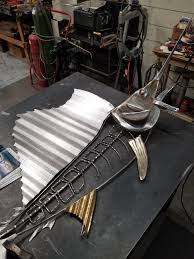Metal fabricators are specialists who use a wide variety of technology and processes to create custom metal parts and assemblies. These processes can range from simple sheet metal cutting and welding to advanced processes like grinding and powder coating. Some custom fabricators also do some stamping or plastic injection molding. Some specialize in specific technologies, such as 3D printing, and some may even provide non-metal additive processes. Whatever your needs may be, hiring Custom Metal Fabrication Connecticut company can help you save time and money.
 There are several advantages to hiring a custom metal fabrication company. For example, custom metal products manufactured by a fabrication company are more cost-effective because the company has good relationships with material suppliers. This allows the company to get competitive prices and good trade discounts. Another advantage of using a fabrication company is their experience. Many fabrication companies can provide design and engineering expertise that you may not be able to find yourself. If you are not sure which type of metal fabrication service to choose, consult with a PMI member.
There are several advantages to hiring a custom metal fabrication company. For example, custom metal products manufactured by a fabrication company are more cost-effective because the company has good relationships with material suppliers. This allows the company to get competitive prices and good trade discounts. Another advantage of using a fabrication company is their experience. Many fabrication companies can provide design and engineering expertise that you may not be able to find yourself. If you are not sure which type of metal fabrication service to choose, consult with a PMI member.
Custom metal fabrication is a highly creative process that results in a unique, custom-made product. There are fewer limitations and restrictions in this process, which enables you to work closely with an expert craftsperson. Custom metal fabrication also offers a high level of precision and quality. Custom metal fabrication specialists can achieve very tight tolerances and precise measurements. The result will be an item of exceptional quality and durability. This is a major benefit of working with a custom metal fabricator.
Custom metal fabrication requires the use of industrial machines to manipulate raw metal stock into the desired shape. Often, these machines are controlled by specialized computer software to process the metal to precise tolerances. A variety of methods are used for the fabrication process, including specialized hot rolling and cold rolling. Hot rolling is used to create raw metal stock, while cold rolling is commonly used to shape sheet metal. Angle and plate rolling are two additional techniques that create defined angles.
Custom metal fabricators use various machines to cut metal stock and join various assembly elements. Some of these tools use plasma cutting and laser cutting. These processes allow for very accurate, clean cuts on virtually any type of metal. They can also produce intricate shapes. Another type of equipment used for custom metal fabrication is punch presses. Punch presses use dies to form holes in metal. These presses can also use electro-mechanical force or hydraulic force.
Custom metal fabrication materials include sheet metal and structural steel. Sheet metal is typically rectangular or square, while structural metal is generally a more complicated shape with a more complicated design. Sheet metal can range in thickness from three-sixteenths of an inch to several inches. Sheet metal can be used to make architectural elements, including beams, angular structures, and hollow forms. Decorative metal can also enhance a building’s curb appeal.
Custom metal fabrication is a great choice if you want to have a specific design or unique look for your product. Typically, metal fabrication projects consist of three phases: the design phase, the fabrication phase, and the installation phase. In most cases, the fabrication process includes several processes, including welding, cutting, bending, and assembly. Once these steps are complete, the end product is complete. Metal fabrication services are excellent for a variety of projects, from cutlery to architectural metals.
Certified Welding Inspectors check each project for quality control and compliance with welding codes. They also check for worker certifications and follow up on the project to make sure it meets the highest quality standards. Certified welding inspectors also ensure that the correct materials are used and that proper certifications are in place. These professionals are dedicated to ensuring high-quality standards are met in every project they complete.
Skip to content
Successful Companies Open Up About Loopholes
